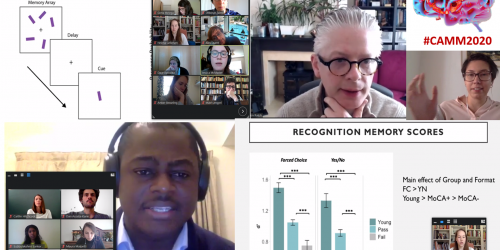Dr Sarah Morgan promoted to Senior Research Associate, Department of Psychiatry
Congratulations to Sarah, Research Fellow at Lucy, who shares her experiences of being a scientist
The BA in Psychological and Behavioural Sciences (PBS) is a wide-ranging and flexible degree, covering cognitive, social, developmental and biological psychology. Many Cambridge Psychology graduates go on to professional courses, and teaching at the University is accredited by the British Psychological Society (BPS).
Lucy Cavendish aims to admit undergraduates in Psychological and Behavioural Sciences each year, and a number of students in Natural Sciences, HSPS and Education follow related pathways, making Psychology one of the most diverse and stimulating subject communities in college. We also have a strong postgraduate presence, with over a dozen MEd, MPhil and PhD Psychologists, alongside research, teaching and professorial staff.
In Part IA students take four papers, two of which are compulsory. The optional papers can be chosen from a varied list of choices.
PBS students again take four papers in Part IB, two of which are compulsory.
In Part II, students take three papers alongside a research dissertation.
Further information can be found on the Faculty and University websites.
Typical offers require
For other qualifications see the main entrance requirements pages on the University website.
Subject Requirements
A-level
Required: Mathematics or Biology
Highly recommended: Biology, Chemistry, Mathematics, Psychology. Please note that you are not required to have studied A level (or equivalent) Psychology in order to make a competitive application.
IB
Required: HL Mathematics* or HL Biology
Highly recommended: Biology, Chemistry, Mathematics, Psychology
*For IB applicants, if taking Mathematics at Higher Level we strongly recommend Analysis and Approaches for the most competitive application, however Applications and Interpretations will also be considered.
Mature students and those taking other qualifications are encouraged to contact our Admissions Office (at admissions@lucy.cam.ac.uk) to discuss the entry requirements for their qualifications.
Written work
One piece of written work is required for this course. Please see our guidance document for more information on the submission of written work.
Assessments
No assessment is required for this course
Interviews
Interviews allow us to distinguish amongst excellent applicants by assessing the skills and aptitudes essential for successful study in higher education, and your academic qualities – essentially, how do you think?
Interviews for all applicants to Lucy Cavendish will take place virtually. The aims and content will still be the same as in-person interviews. You can read more about Lucy Cavendish's online interviews here and you can read the University's information on interviews here.
Each candidate typically has two interviews, lasting between twenty and thirty minutes. In some cases, you will be given preparatory material beforehand.
In a few subjects, you will be interviewed by more than one College or in the Faculty. You will be notified of this in your interview invitation.
Supracurricular exploration is an important way to expand your knowledge of your subject, explore your interests and develop your skills. Our new webpage contains guidance on supracurricular exploration and a comprehensive source of resources, grouped according to undergraduate degrees at Cambridge.
Sign-up for our mailing list
We send out monthly newsletters to update you on exciting events and opportunities happening both in Lucy Cavendish College and across the wider university.
Attend an open day or event
Our Events and Open Days page advertises regular events held by Lucy Cavendish College. If you can, join us for a College Open Day to discuss your application with a member of our admissions team.
Congratulations to Sarah, Research Fellow at Lucy, who shares her experiences of being a scientist

Deborah Talmi, Lucy Fellow and Director of Studies (Psychology), has successfully run an academic conference entirely on Zoom

The paper identifies an urgent need for research in order to minimise and manage the substantial, immediate and long-term effects of Covid-19